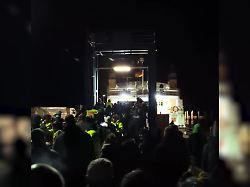A mob in Schlüttsiel harassed the Federal Minister of Economics as he returned from vacation, protesting farmers show gallows and ask Russia for help. I have questions.
2024 begins as a year of anger, with the preliminary climax being farmers’ protests that send Robert Habeck fleeing. There is outrage across party lines. Max Frisch and Marcel Proust examined reality with a questionnaire. Maybe it will work here too.
- Is Robert Habeck’s politics such a threat that it is no longer enough to demonstrate peacefully?
- Have politicians forfeited the right to private spaces at a certain point and is it still a problem to be taken into account if they feel fear?
- How does the mob in Schlüttsiel differ from the torchlight parade of the Corona swearers at the house of Saxon Health Minister Petra Köpping two years ago?
Something has been brewing in Germany for years: the simmering in the closed pots on Whatsapp, Facebook and Telegram is turning into frothy, transgressive violence. There was a lot of debate about the current causes: the CDU under Friedrich Merz was to blame because it deepened right-wing extremist narratives. The traffic lights are to blame because they are pursuing politics against their own people. The global multiple crises are to blame because they overwhelm people. Only the people themselves apparently bear no responsibility for their actions.
- To what extent do you feel threatened when someone talks about a gender gap in the news?
- Do you think it’s incitement when the mainstream criticizes the AfD?
- Do you think the media gets its instructions from the government or the Rothschilds?
A change in anger becomes apparent. The “Union of Values” announces that it will found a party under the easily irritable former intelligence chief Hans-Georg Maaßen. It shouldn’t know any alliance boundaries; everything from the AfD to Wagenknecht goes there, says Maaßen. It’s no longer about left or right, it’s about rejection: anger apparently brings people together. Observers have doubts creeping into their minds with every escalation and every break in the established party system: Is our democracy possibly broken?
- Do you think that Germany will soon collapse, and how much of the blame is the traffic lights for this?
- Is it now that a party like the Greens and their ideas are not just quirky, outlandish, harmful, wrong and stupid, possibly ideological, hysterical, naive and stubborn, but an attack on the German community?
- Are there any politicians left in any party that you trust and if so, why?
The rabble on the fringes has become a new, uncompromising mainstream. This can also be seen in the way in which swearers and right-wing extremists are interfering with the farmers. The usual social networks are hardly usable as soon as you criticize the AfD and its satellites. Anyone who criticizes conspiracy mystics during the pandemic ends up on a kind of enemies list – your columnist is also on there.
- Would it be okay to forcibly stop a politician or journalist from doing their job if they have wrong ideas?
- Have you ever specifically thought about physically attacking a politician in the last 90 days?
- Do you sometimes think that a politician deserves to die?
After all, there is angry desperation and desperate anger in virtually all parties. With Fabio De Masi, a cross-party, highly respected financial politician on the left and a zealous Scholz opponent has joined the “Sahra Wagenknecht Movement” – and thus caused complete bewilderment among companions and observers. The same applies to the former mayor of Düsseldorf, Thomas Geisel: The social democrat has said goodbye to the BSW with a dramatic letter: The “Model Germany” has become a case of restructuring, he writes, he is bothered by arms deliveries, migration policy, and “social benefits” .
- Are elections no longer enough to achieve one’s own goals and is it therefore time for resistance within the meaning of Article 20 Paragraph 4 of the Basic Law?
- If what we are experiencing is “just the beginning,” as one often reads in responses from angry citizens, then what actually is the end?
- What do you have more understanding for: shooting a gas station employee who reminds people to wear masks, or a CDU politician who advises his xenophobic fellow citizens to leave the country?
The political and social sciences have not only been debating the “crisis of democracy” since yesterday. They make connections to globalization, the logic of international financial markets, and the European Union’s legitimacy deficits. The consequences of a policy that supposedly has no alternative have been known for almost ten years, and yet the lack of alternatives in political debates seems to be expanding.
- Which people should best take the place of the politicians who are currently taking the people for a fool – and for what reasons should these people do everything differently than today’s politicians?
- In an emergency, would it be conceivable for you to completely ignore democratic rules and storm the Reichstag with force?
- Do you think it’s time for a revolution?
One might object that democracy indices, such as those from the World Bank, show an improvement in participation for Germany rather than a deterioration. This applies to most Western countries: democracy is doing quite well, at least not significantly worse.
But what is reality! In politics, the following always applies: reality is what can be communicated. And it feels like things are going downhill with democracy and the economy. From an economic point of view, this is not completely wrong, depending on your reference point: the completely undemocratic China has galloped away economically from the democratic West.
Perhaps we are not experiencing a crisis of democracy at all – perhaps the angry citizens are experiencing the crisis because they live in one.
